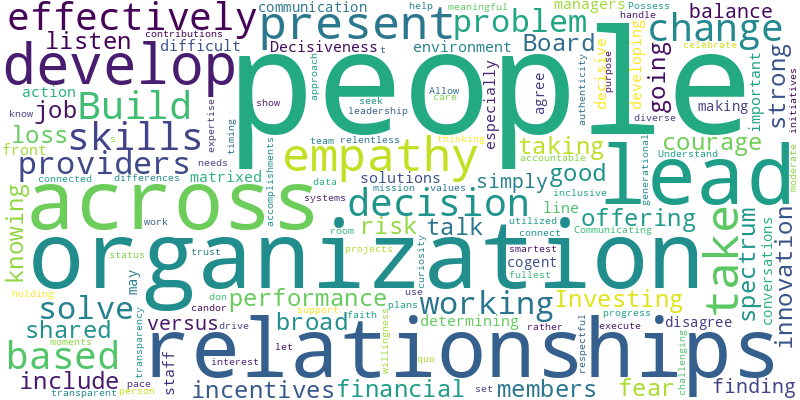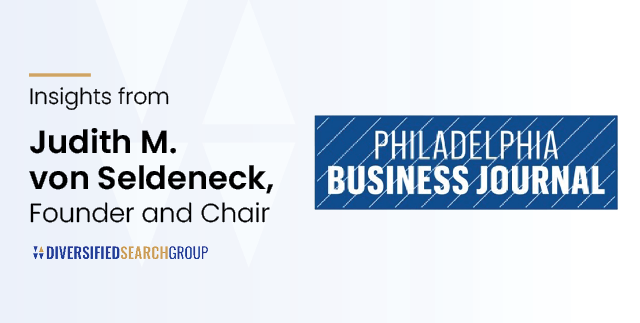Undervalued Leadership Attributes That Are Critical to Success

What makes an effective leader?
It’s a question frequently posed by clients, candidates and other key stakeholders as we engage in the search process and set out to define the characteristics and attributes of successful healthcare leaders. The responses to that question can be multi-faceted. Often, the initial ideas shared are related to more easily defined or easily recognized attributes for a specific role or set of responsibilities.
Common examples include:
- Visionary and strategic thinker
- Strong financial and operational skills
- Transformational change agent
- Effective communicator and relationship developer
- Clinical excellence and programmatic growth
While those are very legitimate and important attributes required in leadership, there are also subtler attributes that can be just as critical to success. Those subtler attributes can often fall under the radar when it comes to defining vital leadership talents and skills. However, they can often be critical in determining how leaders successfully address challenges, enable change and realize success.
Over the past 12 weeks, I attempted to identify those underappreciated attributes of leadership. In doing so, I spoke with CEOs, COOs, CFOs, and CHROs at healthcare organizations across the country. I posed a simple question: What is an undervalued or underappreciated leadership attribute that you feel has been critical to your success?
The responses yielded a fascinating set of insights. Pictured below is a word cloud highlighting words and phrases from the responses, with the size of each word reflecting the scale at which it was mentioned (the larger the word, the more it was mentioned).

From an initial observation, it’s clear to see key words and themes stand out:
People, Organization, Relationships, Across, Lead, Empathy.
“While the headlines in today’s climate focus on many of the key business issues that require complex solutions—financial challenges with Medicaid cuts, adoption of Artificial Intelligence tools, extending access with provider shortages—it’s clear that people will be critical to finding and implementing solutions. ”
Perhaps not a surprising result, but a powerful reminder nonetheless, respondents agreed that healthcare is a people business. Simply put, it involves leading people who care for people.
While the headlines in today’s climate focus on many of the key business issues that require complex solutions—financial challenges with Medicaid cuts, adoption of Artificial Intelligence tools, extending access with provider shortages—it’s clear that people will be critical to finding and implementing solutions.
The results of this exercise helped to confirm that successful leaders must develop and maintain skills and approaches that are heavily people-focused. It’s about more than just communication; it extends deeper into more nuanced leadership skills such as expressing empathy, cultivating courage, and assessing risk.
To provide deeper insights into those themes, I summarized several responses that were offered by executive leaders from the survey:
- Invest in your people to include offering shared incentives for financial performance
- Have the courage to lead through innovation and risk taking, not through the fear of job loss
- Be present with your people and know when to listen, when to talk
- Have empathy for the broad spectrum of what people in an organization are going through and find a balance of simply having empathy versus determining a solution
- Lead front-line staff and managers through difficult decisions and changes with cogent conversations where people may agree or disagree with decision making
- Build trust with people and providers by being transparent with data and inclusive in having their help to develop and execute plans; and then be relentless in holding people accountable
- Take moments to be present with people and celebrate progress, accomplishments and meaningful contributions that connect to purpose
- Understand generational differences of people across the organization and support a diverse set of needs
- Have transparency and authenticity with people and providers
- Allow your people to drive initiatives and projects; don’t seek to be the smartest person in the room but rather let your people’s skills and expertise be utilized to their fullest
- Get to know the people that are working with and for you; build relationships and show them you care
- Develop a systems thinking approach to work across the organization, develop relationships and problem solve
- Possess curiosity, have interest in challenging the status quo and use respectful candor in working with people to solve problems
Looking ahead to 2026, I’m anticipating a year that will continue to present both opportunities and challenges. These responses can be grounding examples that fuel more purposeful and intentional leadership in the face of future adversity. This approach can serve all industries, but it is especially vital for those of us who work in the healthcare sector where leading our people towards sustained success directly impacts the quality of care we deliver to our communities. By learning from these examples and applying these lessons, we can enter 2026 with greater clarity, confidence, and a shared commitment to leading with purpose.
November 6, 2025
Contributed by Bryan J. Christianson, Managing Director, Healthcare Practice – DSG Global.
Related articles
-
?>
-

Insights
How Nonprofit Executive Search is Evolving in 2025
Molly Brennan, DSG Global’s Nonprofit & Social Impact Global Managing Partner and Practice Leader, spoke...
Join the Conversation →
?>
-

Insights
Undervalued Leadership Attributes That Are Critical to Success
What makes an effective leader? It’s a question frequently posed by clients, candidates and other...
Learn More →
?>
-

Insights
Choosing Academic Library Leaders in the Age of AI
As AI transforms libraries, so must the process by which search committees choose library leaders....
Learn More →
?>
-

Insights
The Traits Defining Tomorrow’s CEOs
CEO turnover is accelerating—and so are expectations. According to executive coaching firm Challenger, Gray &...
Learn from Our Experts →
?>
-

Insights
The New Era of Executive Search: Blending Intuition with Innovation
The executive search industry is undergoing a transformation, shaped by the dual forces of technological...
Learn from Our Experts →
?>
-

Insights
Retention Rx: Healthcare Workforce Insights
In today’s healthcare landscape, staffing shortages and burnout aren’t just HR concerns—they’re strategic challenges impacting...
Learn More →
?>
-

Education, Insights, Thought Leadership
Should You Join the Search Committee?
If your institution is going through a leadership transition, you might find yourself with the...
Learn from Our Experts →
?>
-

Education, For Job Seekers, Insights, Thought Leadership
So You Want to Be a Head of School: Guidelines and Guardrails for Independent School Aspiring Heads
You understand the assignment, as today’s kids say. You know the Head’s role well, perhaps...
Learn from Our Experts →
?>
-

Insights, News Category
PBJ: Philadelphia must embrace change, collaboration to unlock full potential
Judith M. von Seldeneck, founder and chair of DSG Global, discusses the importance of Philadelphia’s...
Join the Conversation →
?>
-

Insights, Thought Leadership
Shelly Storbeck On Repairing Trust on College Campuses
Shelly Weiss Storbeck, Strategic Advisor for Diversified Search Group’s Education Practice and the founder of...
Learn from Our Experts →
?>
-

Insights
PBJ: Prioritizing AI is a necessity for leadership
Judith M. von Seldeneck, founder and chair of Diversified Search Group, explains that leadership must...
Join the Conversation →
?>
-

Insights, Leadership
Leadership Tips for Economic Uncertainty
In economic uncertainty, leaders face many challenges. How you handle these challenges determines how well...
Find Resources for Your Journey →